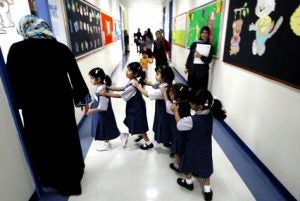 Christy Vang
Christy Vang
Why is it important that Saudi women should have the right and access to education? According to religious and conservative views, women’s primary duties are being mothers, nurturers, and teachers. However, progressively, women’s duties are more than just that. They help society succeed by preparing future leaders and engaging in the economy and political aspects. Education also paves a way for women to reach equal footing as that of men to a certain extent. Recently, women have just had access to education but conservative views prevent progression from further advancements due to religious views.
Wahabism, the strict orthodox that Muhammad ben Adel Waha formed from the Quran due to the decline in social virtue. Wahabism dictated women’s rights and duties. For instance, coeducation or intermingling of the sexes is not permitted. This created an obstacle for women in education because they cannot be in the classrooms with that of men. Due to a lack of female professors, a solution that they have come up with is videoconferencing. All the female students along with female supervisors are in a separate room where there is a television set that broadcasts the male professor and his male students. In addition, there is a one-way telephone line communication between the male professor and the female students. Female students were only allowed to ask questions. There was no room for discussion nor interaction between both sexes. According to researchers, videoconferencing is not an effective form of education because of lack of participation and communication which inhibits collaborative learning.
Other issues posed by Wahabism that effected women’s access to education is a career in like teaching and nurturing is only allowed for women. Women are often discriminated for pursuing other fields of study like journalism, engineering, geography, and mathematics. A way
to battle this is universities like Riyadh’s King Saud University, established in 1989, allowed
women to pursue fields of study like biology, history, and computer science. Yet, even if women were teachers, their abilities and experiences are ignored. For example, even if a female professor is more experienced than a male, she is required to have the materials for a male professor to review before submission. In 2009, Mrs. Noura Al-Fayez, the first Saudi woman to be Vice-Minister of Education, directed female’s education. This reform allowed the understanding of female’s roles of authority in schools. Furthermore, this allows opportunities of improvements and changes to meet the educational needs of females.
Inequality is still often prevalent not only in education but in Saudi society. This is most likely due to the misinterpretations of the Quran and adoptions of customs dictated by Islamic traditions. The Quran asserts that humankind is made equal regardless if men or women. Furthermore, wives have the same rights as their husbands. However, women still lack any form of political and social power because they must rely on their male guardians to voice their opinions as well as grant them permission to perform anything. The idea of segregation between men and women is not a part of the Quran but an Islamic tradition. Because of the blending of these ideologies, Saudi Arabian culture is complex making progression difficult. For instance, education for both men and women are treated differently by placing them in differential tracking systems that puts them in only certain courses depending on their sex. This limits women’s educational properties because women are only taught women activities that only emphasizes their roles as nurturers, mothers, and housewives.
To further improve women’s educational rights and access, proper translations and interpretations of the Quran is necessary to create one of the reforms for progression. Another reform is having coeducation and intermingling of the sexes to create collaborative learners and allow women the opportunity to pursue other careers outside the public domain. Or, women and men should not have to be put into different tracking systems to determine what courses they can and cannot enroll in. Women should be allowed equal access to education so that future suitable leaders can be created. Without equal access to education for women, society will not be able to advance far without women’s contributions and the collaboration of both sexes.
Christy Vang is currently a senior double majoring in Psychology and Anthropology with a minor in Art at East Carolina University. After graduation in December 2018, she hopes to develop her skills and gain experience in aiding at-risk youth. Shortly after, she hopes to join the Peace Corps.